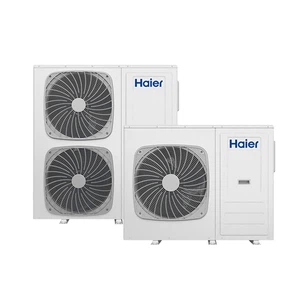In North my country, heating in winter is mainly obtained by burning coal, crude oil, gas and other petrochemical energy sources. Heating and environmental protection have become a pair of irresolvable differences. Domestic sewage is a rare source of cold and heat for heat pump units in severe cold areas in the north. Its temperature is relatively stable all year round. It is higher than the ambient temperature in winter and lower than the ambient temperature in summer. These temperature characteristics make the sewage source heat pump operate more efficiently than traditional air conditioning units, and it has obvious effects on environmental protection, energy saving and operating cost savings. With. Let the wastewater source heat pump manufacturer take you to understand the advantages and disadvantages of wastewater source heat pumps!
To sum up, Greente sewage source heat pump technology has the following characteristics:
1. Environmental protection has obvious economic benefits
The original sewage source heat pump is a heating and air conditioning unit that uses the temperature of urban equipment as a source of cold and heat to carry out heat transfer. After the wastewater passes through the thermal equipment, it retains cooling capacity or heat and returns to the wastewater river section. The wastewater and other equipment Or the operating system does not touch, the waste water is closed, and does not damage the environment and other equipment or water systems. When heating, the boiler system such as raw coal, natural gas, and natural oil is omitted, and there is no ignition process, which avoids pollution of the smoke exhaust system; when cooling, the closed cooling tower is omitted, avoiding the noise and yellowing of the fiberglass cooling tower. Mold environmental pollution. No other waste materials, sewage, organic waste gas and dust are produced, and the ecological benefits are obvious.
2. Environmental protection and energy saving
In winter, the temperature of the wastewater body is higher than the ambient air temperature, so the evaporation temperature of the circulation system of the heat pump unit increases and the energy efficiency level also increases. In summer, the water temperature is lower than the ambient temperature, so the cooling temperature of the cooling tower is reduced, making the cooling effect much better than that of air-cooling and fiberglass cooling towers, and the unit efficiency is improved. The electromagnetic energy spent in heating and cooling can produce about 5KW of heat or cold energy at 1KW. The energy utilization rate is higher than other types of air conditioning systems.
3. Smooth and reliable operation
The temperature of water quality is relatively stable throughout the year, and its variation level is much lower than the change of gas. It is an effective heat source for heat pump units and cold storage of central air conditioners. The characteristics of relatively stable water quality and temperature make the sewage source heat pump generator unit operate more efficiently. Reliable and stable, it also ensures the accuracy and rationality of the operating system. There will be no problems such as defrosting in winter with air source heat pumps.
4. One machine is commonly used and can be used in a wide range of applications
The sewage source heat pump can be used for heating and air conditioning. One machine is commonly used. One system can replace several sets of equipment or systems of the previous heating furnace and air conditioning. The domestic sewage heat pump air conditioning system uses domestic sewage to provide geothermal heating in winter and cooling in summer. The geothermal heating supplies daily boiling water throughout the year. During the summer air-conditioning season, some free daily boiling water can be provided. One system can be used throughout the year to realize triple power supply.
Sewage source heat pump advantages and disadvantages
Dec 05, 2023
Leave a message




